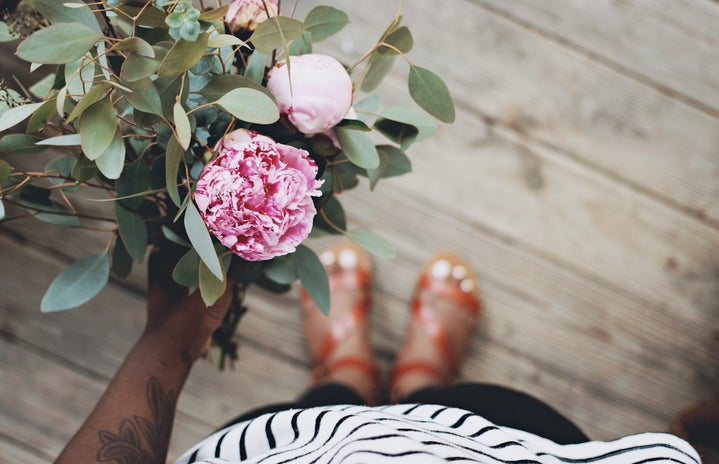The first time I met my now-boyfriend, I was wearing pigtails and a German beer girl costume, and he was dressed as Batwoman in heels and a pushup bra. It was the fall of his sophomore and my junior year of college, and he had long hair, a girlfriend and identified as a gay girl.
Over the next few months, we found excuses to hang out in groups of mutual friends, harmlessly flirting without conscious intent. Yet our eyes began to catch as a momentary indulgence, shelved between misdirected rationalizations. She’s straight, he thought of me. Parker’s gay, I thought, but I’m pretty sure I’m straight. Wait, am I? I’m not attracted to any other female-bodied people. But then he cut his hair short. And then someone called him “he” for the first time and it felt correct in a way that “she” never had. And then he bought his first chest binder and learned that the term for the gut-wrenching anxiety he felt when looking in the mirror was called gender dysphoria.
By March of my senior year, while he was picking out Goodwill sport coats and I a graduation dress, I had a full-blown crush and the sudden realization that I was about to miss my chance. We were both dating other people, dealing with identity issues and surviving college, but I silently promised myself that before graduation, I would work up the courage to kiss Parker. When we finally did, a future together seemed instantly inevitable. We spent that giddy summer learning each other’s boundaries, navigating hesitations, realities and runaway dreams. Although I felt certain I wanted to be with him, I balked every time we talked about telling our friends. I was moving 800 miles away in 60 days: how dare we fall in love now, especially after spending years being just a mile away from one another?
The bigger question, however, was that I was unsure of how having a transgender boyfriend would change my identity. Would my friends think I was gay? Parker wasn’t using male pronouns with most people yet. Would I care if they thought I was gay? This was all new to me: I never had to re-evaluate my entire identity and ethical priorities each time I went on a date with a cisgender guy. One of the first times we went out together in public some guy made aggressive eye contact with Parker when he went to grab my hand. What if Parker and I don’t work out? Is it worth all this effort to figure out who I am and what I care about?
And how do you tell your mom that your boyfriend actually has a female name on Facebook? It took me three months to tell my mom about the best person to ever happen to me, and my mom is the loveliest, most understanding person in the world. In the past, she had never missed a clue and always seemed to know when I was dating someone, but she totally missed it with Parker. I talked about him constantly, I hung out with him every single day, I flew him down to visit me in Georgia a month after I moved, and still, she never asked. I told myself I’d tell her when she stopped accidentally using female pronouns with him. I told myself I’d wait for her to ask, because that would mean she had already thought about all the questions that I hadn’t yet worked out on my own—if I was gay, if biological grandkids were off the table—and I could cop out and just say “yes.” And when I finally confessed that Parker was more than a friend, I didn’t feel an immediate release. It took months for her to ask the questions she needed to ask and months for me to know the answers.
However, your mother isn’t the only one who will ask you personal questions. When it comes up that you have a transgender boyfriend, people don’t recite the normal pleasantries. Aw, where did you meet? How long have you been dating? No—when it comes up that your boyfriend is transgender, the most common remark is So… How does that work? The conversations that result can be friendly and harmless, but sometimes turn unacceptably invasive. What was his girl name? Do you miss penises? Is your boyfriend going to get one?
Things you’ve never thought twice about become issues you have to constantly anticipate. Changing your profile picture to a photo of you and him makes you wonder if the older neighbor you’re friends with on Facebook will unfriend you, and you ask yourself if you care. When your boyfriend is gone too long when he goes to the bathroom, you immediately wonder if he’s facing harassment for using the women’s restroom (since he doesn’t completely pass as female) or for using the men’s restroom (since he doesn’t completely pass as male.) You’ll see him being denied service at a bar, and when you go up to check on him, the bartender immediately takes your order. You feel the fight rising from your stomach but your boyfriend says no, it’s not that big of a deal, it’s happened to him hundreds of times. You hear a politician on the news holding hands with his wife saying “I mean, gay people can do whatever they want, just don’t shove it in my face!” Meanwhile, you’re too afraid to hold your boyfriend’s hand in certain parts of the country. You will hear preachers on the street, or even someone in your life, tell you that nothing you ever do, no good you ever contribute nor successes you achieve, will be enough to cancel out the sin of your own existence. You had always figured you were going to be legally married someday, but now, your boss will ask you if your boyfriend is bringing a ring with him when he moves in with you this summer, and you will smile and laugh it off because he meant it lightheartedly and you don’t want to answer, “Well, we can’t legally marry here, so either we need to change the law or spend thousands of dollars on gender confirmation surgery in order to get his gender marker to be legally male!”
And my experiences are negligible compared to what people who are visibly queer go through. I retain immense straight privilege, since I read as a cisgender straight woman when I’m not with my boyfriend. People use the word “faggot” around me and don’t understand why I could possibly not be okay with that. They give me a hard time for not being easy going when I call them out for using a word that, even in its South Park definition of “obnoxious and annoying,” is an epithet against queer people, since the word uses the perceived obnoxiousness of visible queerness as a yardstick. Jesus, Chloe, let it go. You know I’m not actually homophobic. Why do you even care? Are you gay or something? I’m ashamed that I waited for it to be personal to begin standing up against discrimination.
Parker and I are incredibly lucky. For one, we’re stupidly in love and each other’s best friends and make each other happier than we thought possible, but also, our community is mostly supportive. If I had strictly Christian parents, I would have either never worked up the courage to officially date him or been forced to keep the love of my life secret. Or what if I worked for a company that didn’t have a welcoming environment, where I would feel like my job was jeopardized by bringing my boyfriend to the holiday party? I’m fortunate that my company offers full domestic partnership benefits and that there are visibly queer people in upper management—and in our city, as Parker is currently applying for jobs, he can feel reasonably sure that an HR rep won’t disqualify him on the basis of gender identity. Furthermore, we’re both white, which means we only have to deal with one layer of discrimination and not more. We also are financially secure and in our twenties, so if something were to happen or we did have homophobic parents, we wouldn’t become homeless, as so many LGBTQ+ youth do.
It’s taken me a long time to understand my own queer identity—even to admit I have one. I felt like I was lying if I said I was queer, because I am someone who identifies as female who is attracted to someone who identifies as male. Am I devaluing Parker’s masculinity by saying that I am not straight just because he is not cisgender? Am I appropriating the experiences of “real” queer people by admitting that I have to deal with things I’ve never confronted in cisgender straight relationships? How could I possibly know what it’s like when I get to choose if I am treated as queer or as straight, when Parker has no other option? But as a person who is not visibly queer dating a trans guy who doesn’t always pass as male, I do understand some of what it’s like, just as a white woman dating a black man will experience the world differently than a white woman dating a white man. My sexuality is still straight, but I am part of the queer community.
It didn’t take courage for me to fall in love with Parker. It was the easiest thing in the world, just like all the stories you’ve ever heard about love and happy endings. But it did take courage to kiss him for the first time, and it took courage to tell people about it. That doesn’t make me a hero—anyone looking for brave people to lionize should research transmisogyny and go worship the ground a transgender woman of color walks on—but our imperfect society is a reality that anyone in their first queer relationship will have to confront. Don’t let it stop you.
Do you have a story to share? Submit your story to Her Story!

